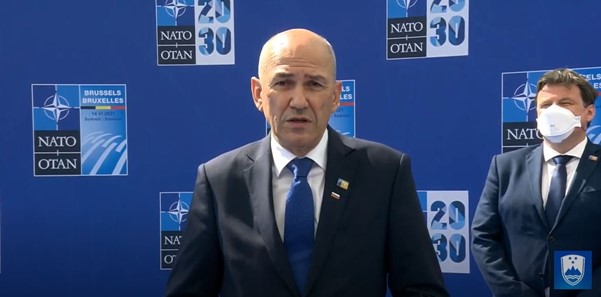Prime Minister Janez Janša and the Deputy Prime Minister and Minister of Defence, Matej Tonin, M.Sc., were in Brussels on Monday, where the NATO Summit took place, which focused on the NATO 2030 process, a future-oriented agenda centred on adapting NATO to new challenges. These challenges include: relations with Russia, terrorism, cyber-attacks and breakthrough technologies, the rise of China and the security implications of climate change.
“If we do not want the world to face a fatal new arms race or even a hot conflict in the coming decades, NATO must be aware of this and stay strong,” the Prime Minister stressed upon his arrival at the Summit.
In his statement to the media, Janez Janša initially said that Slovenia is celebrating the 30th anniversary of its independence this year, which is something he feels would not have been possible without NATO’s victory in the Cold War. “Slovenia joined NATO because of shared fundamental values.” These are, according to the Prime Minister, the core of the North Atlantic Alliance and should be borne in mind in the talks about its future.
In the Prime Minister’s opinion, another important factor for the future of the Alliance is expansion. “If NATO does not expand, someone else will, and that will not contribute to global peace and stability.” Talking about expansion means inviting all the democratic countries in the “neighbourhood” that would like to join the Alliance to cooperate with NATO. Expansion also means inviting other partners, i.e., the free and democratic countries that share our fundamental values and wish to cooperate more closely with the Alliance, to join in. Prime Minister Janša went on to emphasise that in order to achieve the fundamental objectives, we must support every joint effort aimed at ensuring the technological edge of the NATO countries, particularly in the field of military technology. “We must be at least one generation ahead of others.” According to the Prime Minister, this is the only way we will be strong enough to reach the main goal – world peace.
China poses a key challenge for NATO
Janša also stressed that the world and threats have changed over the last decades and that China is a key challenge for NATO. “If we do not want the world to face a fatal new arms race or even a hot conflict in the coming decades, NATO must be aware of this and stay strong.” This is the only way for NATO to be a partner that is taken seriously in the talks and is able to reach agreements that will maintain world peace. The Prime Minister also highlighted that in the past, Slovenia did not particularly stand out in terms of financial contribution to the shared budget, but that the trend has changed over the term of the current Government. The reason for this lies mainly in the Act on the Provision of Funds for Investments in the Slovenian Armed Forces, based on which Slovenia will significantly increase its defence capacities and finally also be able to cooperate seriously with the NATO partners. “We realise that the Alliance is something that works in both directions. If we expect others to increase their defence budgets so that they can guarantee our security, then we too must do our part.” Slovenia will not be able to achieve the goals set by NATO in 2014. “In 2030, Slovenia will be a NATO member that can proudly say, ‘we are pleased that you safeguard our security, but we too can contribute to the same degree to our common security,” said the Prime Minister, concluding his statement to the media.
Prime Minister Janša also held bilateral talks in Brussels. During the NATO Summit, he first met with the Icelandic Prime Minister Katrín Jakobsdóttir to discuss the priorities of the Slovenian Presidency of the Council of the EU, as well as the EU-Iceland relations. Next, he met with Norwegian Prime Minister Erna Solberg. This meeting was also primarily focused on presenting the priorities of the Slovenian Presidency of the Council of the EU. The talks also touched on the EU-Norway relations. Prime Minister Janša also met with the North Macedonian Prime Minister Zoran Zaev in Brussels on Monday to present the priorities of the Slovenian Presidency of the EU Council, particularly those relating to the Western Balkans.
Government Communication Office of the Republic of Slovenia


